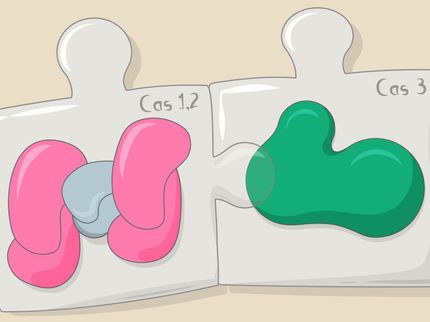Probiotic formula reverses cow's milk allergies by changing gut bacteria of infants
The gut bacteria of infants who developed tolerance to cow's milk after treatment with probiotic formula showed significant differences from those who remained allergic, according to a new study by scientists from the University of Chicago, Argonne National Laboratory and the University of Naples Federico II, Italy.
The newly tolerant infants had higher levels of several strains of bacteria that produce short chain fatty acids, such as butyrate, which help maintain homeostasis in the gut. The discovery of bacteria that drive tolerance to problem foods like cow's milk could be crucial to developing new treatments to help children with food allergies.
Emerging evidence suggests that modern environmental influences, including widespread antibiotic use, high-fat and low-fiber diets, reduced exposure to infectious diseases, Caesarean birth and formula feeding have altered the mutually beneficial relationship between humans and the bacteria that live in our gastrointestinal tract. This dysbiosis, or skewing of the structure of the microbial community, can predispose genetically susceptible individuals to allergies.
Previous research from collaborator Roberto Berni Canani and his team at the University of Naples showed that infants with cow's milk allergy who are fed formula containing a form of the milk protein casein, supplemented with the probiotic bacterial species Lactobacillus rhamnosus GG (LGG), develop tolerance at higher rates than those treated with a non-probiotic formula.
"Mouse model work from our laboratory published last year identified a common class of mucus-associated gut bacteria that play a critical role in regulating the access of dietary allergens to the bloodstream" said Cathryn Nagler, PhD, Bunning Food Allergy Professor at the University of Chicago and lead author of the study. "This suggests a novel mechanism by which commensal bacteria regulate allergic responses to food."
To examine whether probiotic administration modulates gut bacterial composition to enhance acquisition of tolerance to cow's milk, Nagler and colleagues performed sequence analysis to identify bacteria in stool samples collected from healthy infant subjects, infants with cow's milk allergy who had been fed the LGG enriched probiotic formula, and those who had been fed the formula without added probiotics.
Overall, the gut microbiome of infants with a cow's milk allergy was significantly different than healthy controls, suggesting that differences in the structure of the bacterial community indeed influence the development of allergies. Infants treated with the LGG probiotic formula who developed tolerance to cow's milk also had higher levels of bacteria that produce butyrate than those who were fed the probiotic formula but did not develop tolerance. This further suggests that tolerance is linked to the acquisition of specific strains of bacteria, including Blautia and Coprococcus, which produce butyrate.
Other news from the department science

Get the life science industry in your inbox
By submitting this form you agree that LUMITOS AG will send you the newsletter(s) selected above by email. Your data will not be passed on to third parties. Your data will be stored and processed in accordance with our data protection regulations. LUMITOS may contact you by email for the purpose of advertising or market and opinion surveys. You can revoke your consent at any time without giving reasons to LUMITOS AG, Ernst-Augustin-Str. 2, 12489 Berlin, Germany or by e-mail at revoke@lumitos.com with effect for the future. In addition, each email contains a link to unsubscribe from the corresponding newsletter.





















































